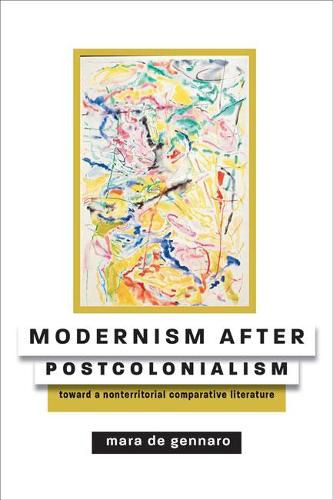Readings Newsletter
Become a Readings Member to make your shopping experience even easier.
Sign in or sign up for free!
You’re not far away from qualifying for FREE standard shipping within Australia
You’ve qualified for FREE standard shipping within Australia
The cart is loading…






A polemical reaction against a trend in global modernist studies which still privileges European and Anglophone texts.
Existing studies of literary modernism generally read Anglophone Atlantic texts through the lens of critical theories emanating from Europe and North America. In Modernism after Postcolonialism, Mara de Gennaro undertakes a comparative Anglophone-Francophone study, invoking theoretical frameworks from Gayatri Spivak, Edouard Glissant, Francoise Verges, Michel-Rolph Trouillot, Dipesh Chakrabarty, and others. Examining transnational poetics of comparison that contest the comparative practices of colonialist, racist, and ethno-nationalist discourses, the book treats these poetics as models for a creolist critical method of reading, one that searches out unpredictable, mutually generative textual relations obscured by geographic and linguistic divides.
In each chapter, de Gennaro pairs a canonical English-language modernist writer (Gertrude Stein, T. S. Eliot, E. M. Forster, Virginia Woolf) with a postcolonial writer (Aime Cesaire, Glissant, Patrick Chamoiseau, J. M. Coetzee, Edwidge Danticat), interpreting major works of prewar and interwar modernism in light of postcolonial and Francophone literature, cultural theory, and historiography. Read together, these texts suggest a turn-sometimes subtle or conflicted in earlier Atlantic modernist texts, while usually more overt in later Caribbean and postcolonial texts-toward comparative forms marked by irresolution and a wavering sense of authority. With the rise of world literature and global modernist studies, it becomes all the more pressing to examine how comparative forms can alert us to unspoken and misrecognized relations while also confronting us with the difficulty of representing the Other.
By bringing into relation these ostensibly unconnected, often discrepant texts, de Gennaro challenges entrenched territorial habits of literary meaning. An aspirationally nonterritorial comparative literature, she argues, diverges not only from Eurocentric formalist approaches but also from global comparatisms that emphasize incommensurabilities to the point of eliding significant textual and contextual connections. Drawing on interdisciplinary postcolonial efforts, especially in the social sciences, to deterritorialize categories of identity, culture, and community, Modernism after Postcolonialism dispenses with outdated modernist and postcolonial paradigms to reveal how the anxious, inconclusive comparisons of transnational modernist poetics can call us to imagine new solidarities across bounded territories.
$9.00 standard shipping within Australia
FREE standard shipping within Australia for orders over $100.00
Express & International shipping calculated at checkout
A polemical reaction against a trend in global modernist studies which still privileges European and Anglophone texts.
Existing studies of literary modernism generally read Anglophone Atlantic texts through the lens of critical theories emanating from Europe and North America. In Modernism after Postcolonialism, Mara de Gennaro undertakes a comparative Anglophone-Francophone study, invoking theoretical frameworks from Gayatri Spivak, Edouard Glissant, Francoise Verges, Michel-Rolph Trouillot, Dipesh Chakrabarty, and others. Examining transnational poetics of comparison that contest the comparative practices of colonialist, racist, and ethno-nationalist discourses, the book treats these poetics as models for a creolist critical method of reading, one that searches out unpredictable, mutually generative textual relations obscured by geographic and linguistic divides.
In each chapter, de Gennaro pairs a canonical English-language modernist writer (Gertrude Stein, T. S. Eliot, E. M. Forster, Virginia Woolf) with a postcolonial writer (Aime Cesaire, Glissant, Patrick Chamoiseau, J. M. Coetzee, Edwidge Danticat), interpreting major works of prewar and interwar modernism in light of postcolonial and Francophone literature, cultural theory, and historiography. Read together, these texts suggest a turn-sometimes subtle or conflicted in earlier Atlantic modernist texts, while usually more overt in later Caribbean and postcolonial texts-toward comparative forms marked by irresolution and a wavering sense of authority. With the rise of world literature and global modernist studies, it becomes all the more pressing to examine how comparative forms can alert us to unspoken and misrecognized relations while also confronting us with the difficulty of representing the Other.
By bringing into relation these ostensibly unconnected, often discrepant texts, de Gennaro challenges entrenched territorial habits of literary meaning. An aspirationally nonterritorial comparative literature, she argues, diverges not only from Eurocentric formalist approaches but also from global comparatisms that emphasize incommensurabilities to the point of eliding significant textual and contextual connections. Drawing on interdisciplinary postcolonial efforts, especially in the social sciences, to deterritorialize categories of identity, culture, and community, Modernism after Postcolonialism dispenses with outdated modernist and postcolonial paradigms to reveal how the anxious, inconclusive comparisons of transnational modernist poetics can call us to imagine new solidarities across bounded territories.